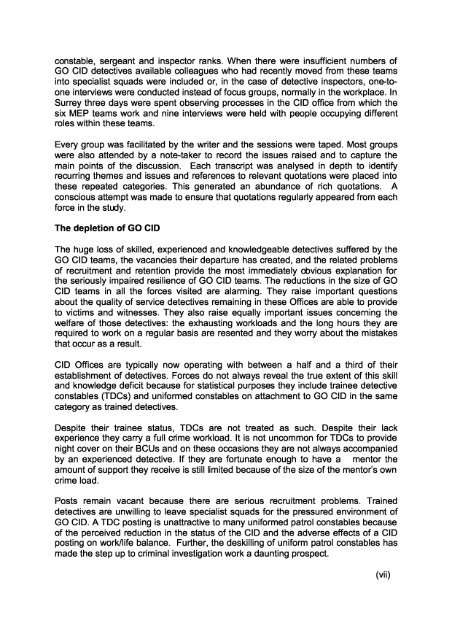LOSING THE DETECTIVES: VIEWS FROM THE ... - Police Federation
LOSING THE DETECTIVES: VIEWS FROM THE ... - Police Federation
LOSING THE DETECTIVES: VIEWS FROM THE ... - Police Federation
You also want an ePaper? Increase the reach of your titles
YUMPU automatically turns print PDFs into web optimized ePapers that Google loves.
constable, sergeant and inspector ranks. When there were insufficient numbers of<br />
GO CID detectives available colleagues who had recently moved from these teams<br />
into specialist squads were included or, in the case of detective inspectors, one-toone<br />
interviews were conducted instead of focus groups, normally in the workplace. In<br />
Surrey three days were spent observing processes in the CID office from which the<br />
six MEP teams work and nine interviews were held with people occupying different<br />
roles within these teams.<br />
Every group was facilitated by the writer and the sessions were taped. Most groups<br />
were also attended by a note-taker to record the issues raised and to capture the<br />
main points of the discussion. Each transcript was analysed in depth to identify<br />
recurring themes and issues and references to relevant quotations were placed into<br />
these repeated categories. This generated an abundance of rich quotations. A<br />
conscious attempt was made to ensure that quotations regularly appeared from each<br />
force in the study.<br />
The depletion of GO CID<br />
The huge loss of skilled, experienced and knowledgeable detectives suffered by the<br />
GO CID teams, the vacancies their departure has created, and the related problems<br />
of recruitment and retention provide the most immediately obvious explanation for<br />
the seriously impaired resilience of GO CID teams. The reductions in the size of GO<br />
CID teams in all the forces visited are alarming. They raise important questions<br />
about the quality of service detectives remaining in these Offices are able to provide<br />
to victims and witnesses. They also raise equally important issues concerning the<br />
welfare of those detectives: the exhausting workloads and the long hours they are<br />
required to work on a regular basis are resented and they worry about the mistakes<br />
that occur as a result.<br />
CID Offices are typically now operating with between a half and a third of their<br />
establishment of detectives. Forces do not always reveal the true extent of this skill<br />
and knowledge deficit because for statistical purposes they include trainee detective<br />
constables (TDCs) and uniformed constables on attachment to GO CID in the same<br />
category as trained detectives.<br />
Despite their trainee status, TDCs are not treated as such. Despite their lack<br />
experience they carry a full crime workload. It is not uncommon for TDCs to provide<br />
night cover on their BCUs and on these occasions they are not always accompanied<br />
by an experienced detective. If they are fortunate enough to have a mentor the<br />
amount of support they receive is still limited because of the size of the mentor’s own<br />
crime load.<br />
Posts remain vacant because there are serious recruitment problems. Trained<br />
detectives are unwilling to leave specialist squads for the pressured environment of<br />
GO CID. A TDC posting is unattractive to many uniformed patrol constables because<br />
of the perceived reduction in the status of the CID and the adverse effects of a CID<br />
posting on work/life balance. Further, the deskilling of uniform patrol constables has<br />
made the step up to criminal investigation work a daunting prospect.<br />
(vii)
















